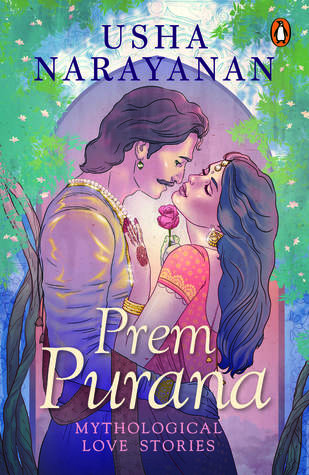The Title of the Story: Prem Purana
Author: Usha Narayanan
Cover: Very Classy with an artistic inclination. Kudos to the artist.
Editing: Well edited
The language of the author: Good command over the language.
Star Rating: 5 stars.
In an age when mythology is written, rewritten according to the perception of a writer's viewpoint, it's a miracle that we still remember Krishna or Rama as they were perceived during the times of Mahabharata and Ramayana. It's becoming equally difficult to distinguish between the original and the perceptions. Mythology is no more true to its form and changing rapidly according to the need of the hour. And it's not wrong to do so. Clinging to age-old values is not possible if one has to inculcate values amongst the younger generation. I think Amish Tripathi in his perception of Shiva has done a great job in bringing out the love of mythology amongst the younger generation. And with that, the floodgates have opened and many writers are now leaving their mark in this genre.
One of the leading personalities in this field is Usha Narayanan. With her Secret of the God's Son and Pradyuman she had captured the hearts of many mythological lovers weaving the story of Lord Kama's rebirth with all its fascinating details. Prem Purana, the latest publication of Ms. Narayanan is a collection of three short stories that kept me engrossed for a long time. I took time to read this book. Pages after pages, I lost myself in the story of Ganesha, Ravana, and Nal.
Ganesha's story starts with him meeting Riddhi and then Siddhi and Buddhi are introduced. Frankly speaking, I had no clue about the three wives of Ganesha and always thought he had two wives. The characterization of the three is very interesting, from being the beauty to a brain to a brawn. Somehow I found that the doctrine of Durga, Lakshmi and Saraswati is retold through these three sisters. Or maybe that is what needs to be told to the younger generation, every time, in every form. Ganesha needed all these qualities to fulfill the reason behind his future reincarnations. Beautiful thought. The way he went about wooing each of the sisters and how it ended with each of the sisters finding their true love is the crux of this beautiful saga. While Polygamy is no longer in vogue, we somehow have to raise our consciousness to understand that these stories are not about three women but three qualities in a woman. My research told me that it is us, humans, who have bifurcated the three qualities into three women but in reality, it was one for they all were one soul. And this is true in all the stories of our Gods and Goddesses. Again, this is my theory.
Ravana's love story sent a few chills down my spine. I had a mixed feeling about this one. Ravana, you just can't like in this story, yet he has a love story. Should I feel sorry for Mandodari or applaud her strength in finding something good in a man who is hated till today? There was not one redeeming quality in this man according to Ms. Narayanan's interpretation. Yet many historians and mythological writers believe that Ravana was a demon who dared to challenge the Gods but according to Ms. Narayanan's penning, Ravana was a brute who had no redeeming quality. Except for the last line where he recognized the great soul Rama was.
While Ganesha's story was the innocence of love Ravana's was the fiery passion where a dark soul could love yet destroy the very person he claimed to have loved. As against these two stories Nal and Damyanti's story was about the pain in love. The pathos. How after getting the love of one's dear desire, one is not able to stay with their loved ones due to the wrong decisions that are taken on a spur of the moment.
Each story deals with a particular rasa of love and each one has some message to impart. One of the strengths of a mythological tale is to leave some message for the present generation and I think Ms. Narayanan had achieved them beautifully.
Totally recommended for those who love mythology and would love to know where our Indian philosophies of life and love stem from.
Grab your copy from:

Thank you for the amazing review, Rubina! I always look forward to your take on my books as you perceive deeper layers of meaning.
ReplyDelete